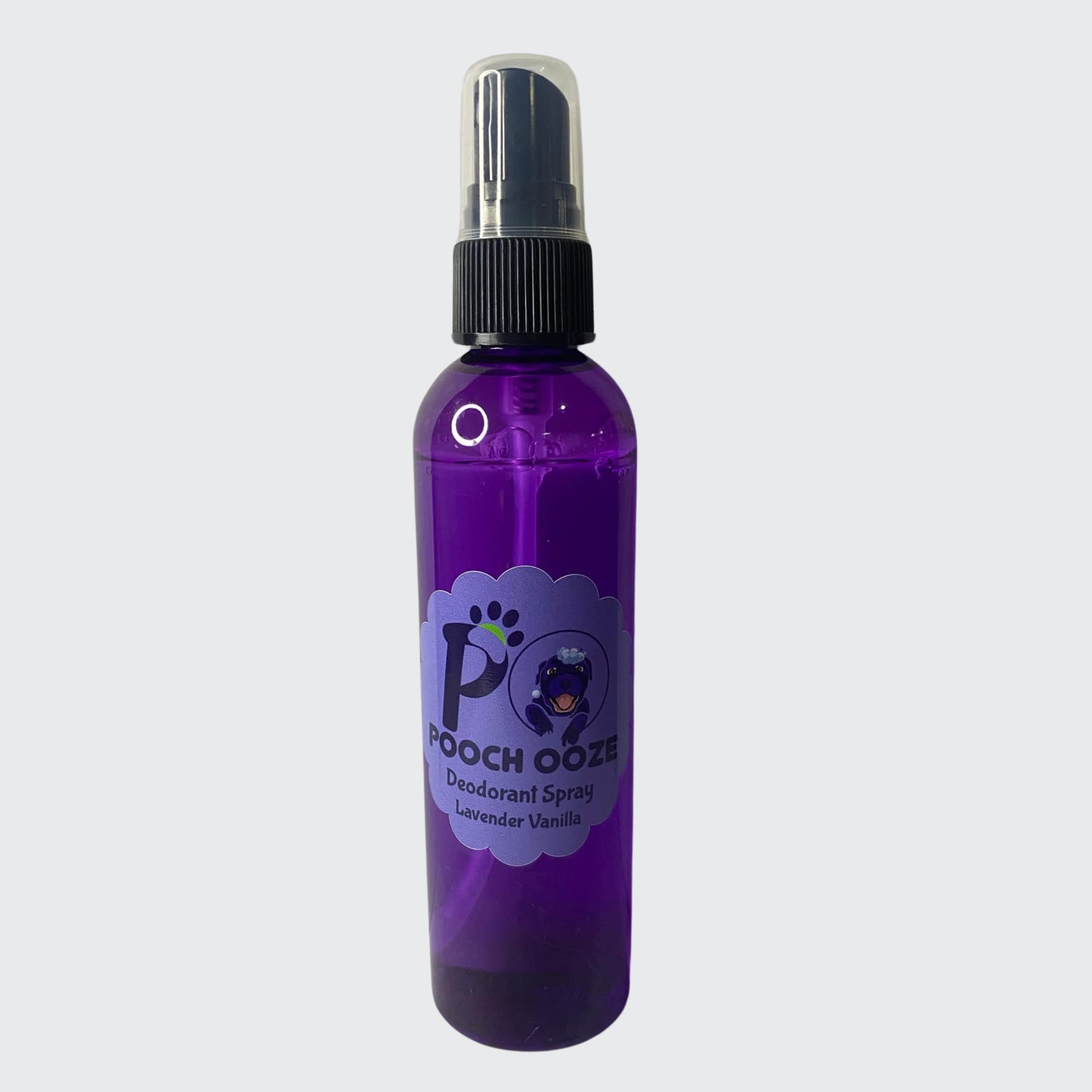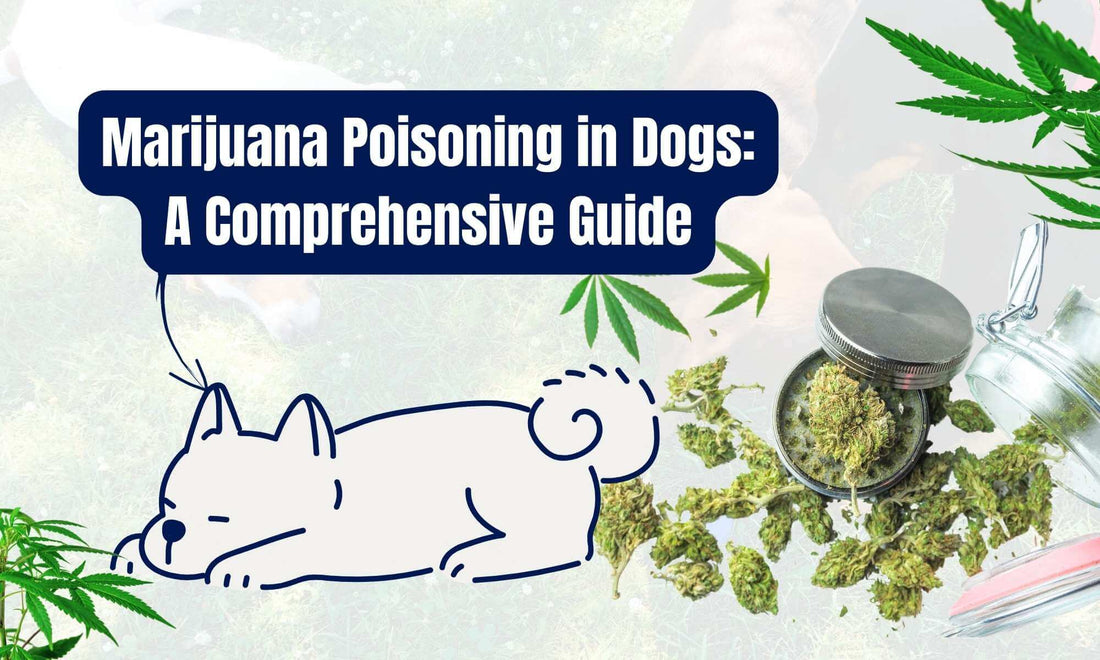In recent years, there has been a significant surge in instances of dogs experiencing marijuana intoxication. Although it rarely results in death, it does manifest distressing symptoms, making it crucial to promptly consult a veterinarian if you suspect your canine companion has consumed this substance.
As responsible dog owners, it's essential to be aware of the potential dangers that certain substances can pose to our beloved pets. In this article, we will provide you with in-depth information about marijuana poisoning in dogs, including its causes, symptoms, treatment options, and preventive measures. Our aim is to equip you with the knowledge needed to ensure the well-being and safety of your canine companion.

The Surge in Reported Cases: Unveiling the Factors Behind the Drastic Rise
Since California's groundbreaking decision to legalize cannabis for medicinal purposes in 1996, the acceptance and accessibility of marijuana have expanded across the United States. With only a handful of states still maintaining their prohibition, an increasing number of states have also embraced its recreational use. However, this societal shift has brought unforeseen consequences, particularly in the realm of pet health. Specifically, a distressing trend has emerged in recent years, with a significant surge in reported cases of dogs suffering from marijuana toxicosis. This article aims to delve into the underlying factors contributing to this alarming rise, shedding light on the issue from various perspectives.
The Impact of Increased Accessibility: With marijuana now more readily available due to its legalization, there has been a proportional increase in cases involving pets inadvertently consuming the substance. The Animal Poison Control Center, for instance, documented an astounding 765% surge in calls related to pets ingesting marijuana in 2019, compared to the same period in the previous year. This unprecedented spike in reported cases demonstrates the profound impact of the drug's heightened accessibility on the well-being of our furry companions. Likewise, the Pet Poison Helpline experienced an upward trajectory of over 400% in marijuana-related incidents over a span of six years, emphasizing the urgent need for a closer examination of this issue.
Unveiling the Extent of the Issue: The growing concern surrounding the surge in marijuana toxicosis cases in dogs compelled researchers to conduct a retrospective clinical study. This study focused on evaluating the trends of marijuana toxicosis in dogs residing in a state that legalized medical marijuana usage between 2005 and 2010. The findings of this study revealed an alarming four-fold increase in the number of reported cases in the two Colorado veterinary hospitals under investigation. The study's results underline the severity of the issue, highlighting the pressing need for further research and proactive measures to safeguard the well-being of our canine companions.
As the acceptance and availability of marijuana have soared across the United States, a parallel surge in reported cases of dogs suffering from marijuana toxicosis has emerged. This disconcerting trend warrants immediate attention from both pet owners and the wider community. By understanding the impact of increased accessibility and acknowledging the profound consequences faced by our beloved pets, we can collectively address this issue. It is crucial to promote responsible marijuana usage, implement preventive measures, and further educate pet owners about the potential risks associated with their pets' exposure to marijuana. Only through concerted efforts and a commitment to the well-being of our furry friends can we mitigate the detrimental effects of this rising concern.
Understanding Marijuana Poisoning
Marijuana, also known as cannabis, is a psychoactive substance that contains THC (delta-9-tetrahydrocannabinol). While marijuana is widely used for recreational and medicinal purposes by humans, it can have adverse effects on dogs if ingested. Dogs are particularly sensitive to THC, and even a small amount can result in marijuana poisoning.
How Do Dogs Get Exposed to Marijuana?
Dogs can come into contact with marijuana in various ways, including:
• Ingesting marijuana edibles: Dogs may consume marijuana-infused foods or treats accidentally left within their reach.
• Inhalation: Secondhand smoke or vapor from marijuana can affect dogs if they are exposed to it in enclosed spaces.
• Ingesting raw marijuana: Dogs may chew on or eat marijuana plants or buds, particularly if they have access to them in gardens or outdoor areas.
Recognizing the Symptoms
It's crucial to be able to recognize the symptoms of marijuana poisoning in dogs. Prompt identification can help you seek appropriate treatment and ensure the best possible outcome for your pet. Common symptoms include:
• Altered behavior: Dogs may appear lethargic, disoriented, or uncoordinated.
• Depression: A dog suffering from marijuana poisoning may exhibit signs of depression or unusual sadness.
• Lack of appetite: Loss of interest in food is a common symptom, leading to weight loss.
• Urinary incontinence: Dogs may experience difficulty controlling their bladder or exhibit increased urination.
• Slow heart rate: Marijuana can cause a decrease in heart rate, which may be noticeable in affected dogs.
• Dilated pupils: The dog's pupils may appear larger than usual.
• Tremors or seizures: In severe cases, dogs may experience muscle tremors or even seizures.
Seeking Veterinary Care
If you suspect that your dog has ingested marijuana or is showing any symptoms of marijuana poisoning, it is crucial to seek veterinary care immediately. Remember, your veterinarian is the best person to diagnose and treat your dog. Be prepared to provide the following information:
• Timing: When did you first notice the symptoms?
• Quantity: How much marijuana do you think your dog may have ingested?
• Observations: Share any additional symptoms or observations you have noticed in your dog's behavior.
Diagnostic Process
Upon arrival at the veterinary clinic, the veterinarian will conduct a thorough examination of your dog. The diagnostic process may involve:
• Physical examination: The veterinarian will assess your dog's vital signs, neurological function, and overall condition.
• Toxicity screening: Tests may be performed to confirm marijuana poisoning and rule out other possible causes.
• Blood work: Blood samples may be analyzed to evaluate organ function and assess the severity of poisoning.
Treatment Options
The treatment approach for marijuana poisoning in dogs primarily focuses on supportive care and minimizing the effects of THC. Depending on the severity of the condition, treatment options may include:
• Inducing vomiting: If ingestion occurred recently, the veterinarian may induce vomiting to remove the marijuana from the dog's system.
• Activated charcoal: Administering activated charcoal may help absorb any remaining toxins in the dog's stomach and prevent further absorption into the bloodstream.
• Intravenous fluids: Providing intravenous fluids helps to maintain hydration and flush out the toxins from the body.
• Monitoring: Close monitoring of the dog's vital signs, body temperature, and overall condition is crucial throughout the treatment process.
• Symptomatic care: Medications or treatments may be administered to address specific symptoms such as seizures, tremors, or nausea.
• Hospitalization: In severe cases or if complications arise, hospitalization may be necessary to ensure intensive care and constant monitoring.
It's important to note that home remedies or over-the-counter medications should never be used without veterinary guidance, as they can potentially worsen the condition or cause additional complications.
Prevention and Safety Measures
Preventing marijuana poisoning in dogs primarily involves creating a safe environment and being cautious with marijuana products. Here are some preventive measures to consider:
• Secure storage: Keep all marijuana products securely stored in a location inaccessible to your dog, such as locked cabinets or high shelves.
• Dispose of waste properly: Ensure that any marijuana waste, including edibles packaging or discarded plant material, is safely disposed of in a secured trash can.
• Education and awareness: Educate yourself and your family members about the potential risks of marijuana to dogs and the importance of keeping it out of their reach.
• Secondhand exposure: Avoid exposing your dog to secondhand marijuana smoke or vapor by using marijuana products in well-ventilated areas away from your pet.
• Training and supervision: Train your dog to avoid picking up or ingesting unknown substances while on walks or in outdoor environments.
• Garden safety: If you have marijuana plants or use them for gardening, ensure that your dog cannot access the area.
By implementing these preventive measures, you can significantly reduce the risk of marijuana poisoning and promote a safe environment for your furry friend.
Here are some frequently asked questions (FAQs) regarding marijuana poisoning in dogs:
Can dogs get high from marijuana?
Yes, dogs can get high from marijuana if they ingest or inhale it. THC, the psychoactive component in marijuana, affects dogs differently than humans and can lead to marijuana poisoning.
What are the signs of marijuana poisoning in dogs?
Signs of marijuana poisoning in dogs may include lethargy, disorientation, lack of coordination, depression, loss of appetite, urinary incontinence, slow heart rate, dilated pupils, and, in severe cases, tremors or seizures.
How much marijuana does it take to poison a dog?
Even a small amount of marijuana can potentially poison a dog. Dogs are more sensitive to THC, and the effects can be severe, even with small doses. It is important to keep all marijuana products out of reach of dogs.
What should I do if I suspect my dog has ingested marijuana?
If you suspect your dog has ingested marijuana or is showing symptoms of marijuana poisoning, it is crucial to seek immediate veterinary care. Contact your veterinarian and provide them with information about the incident, including timing, quantity of marijuana ingested, and observed symptoms.
Can marijuana poisoning be fatal for dogs?
While marijuana poisoning is rarely fatal, it can still have serious health implications for dogs. The severity of symptoms and potential complications depend on the amount ingested and the size of the dog. Seeking prompt veterinary care is vital for a positive outcome.
How is marijuana poisoning diagnosed in dogs?
Veterinarians diagnose marijuana poisoning in dogs through a combination of physical examination, symptom evaluation, and, in some cases, toxicity screening and blood work to rule out other possible causes.
What is the treatment for marijuana poisoning in dogs?
The treatment for marijuana poisoning in dogs primarily focuses on supportive care. It may involve inducing vomiting, administering activated charcoal, providing intravenous fluids, monitoring vital signs, and addressing specific symptoms. Severe cases may require hospitalization.
How can I prevent marijuana poisoning in my dog?
To prevent marijuana poisoning in dogs, store all marijuana products securely out of your dog's reach, properly dispose of waste, avoid exposing your dog to secondhand smoke or vapor, and educate yourself and your family members about the risks. Training your dog to avoid unknown substances and ensuring a safe garden environment are also important preventive measures.
Are there long-term effects of marijuana poisoning in dogs?
In most cases, dogs recover fully from marijuana poisoning without long-term effects. However, severe cases or delays in treatment may lead to complications. It's crucial to consult with a veterinarian for proper care and follow-up.
Can I use home remedies to treat marijuana poisoning in my dog?
No, home remedies or over-the-counter medications should not be used without veterinary guidance. It is essential to seek professional veterinary care to ensure appropriate treatment and the well-being of your dog.
Remember, consulting with a veterinarian is crucial for accurate information, diagnosis, and treatment related to marijuana poisoning or any other health concerns for your dog.
In conclusion, marijuana poisoning in dogs can have serious health implications, but with awareness and preventive measures, it is entirely preventable. By understanding the symptoms, seeking prompt veterinary care, and implementing safety measures, you can keep your dog safe from marijuana toxicity.
Remember, if you suspect marijuana poisoning or notice any concerning symptoms in your dog, consult your veterinarian immediately. Their expertise and guidance are essential for proper diagnosis, treatment, and care.
By prioritizing your dog's well-being and taking proactive steps, you can ensure a healthy and happy life for your four-legged companion. Stay informed, stay vigilant, and keep your dog safe from the potential dangers of marijuana.
Stay updated with our future articles on pet health and safety. We are here to provide you with valuable information and support for all your canine-related concerns.
Note: The content provided in this article is for informational purposes only and should not be considered as veterinary advice. Always consult with a qualified veterinarian for professional guidance tailored to your dog's specific needs and circumstances.



